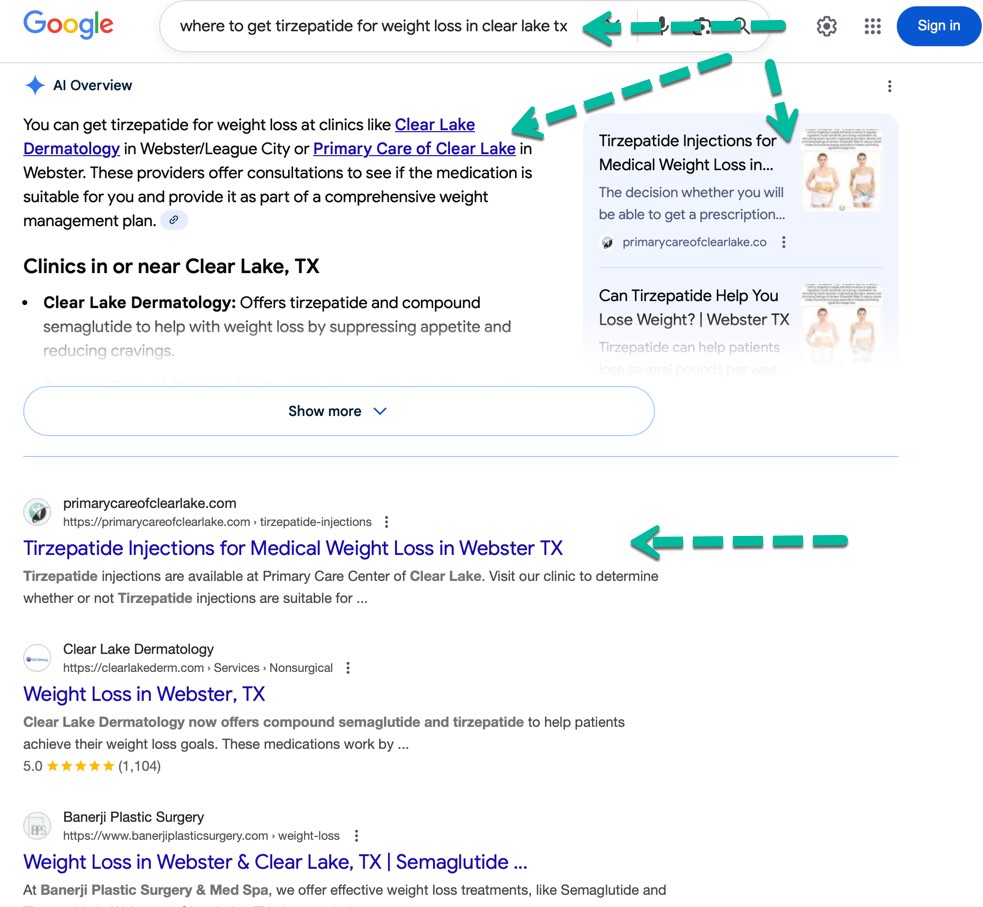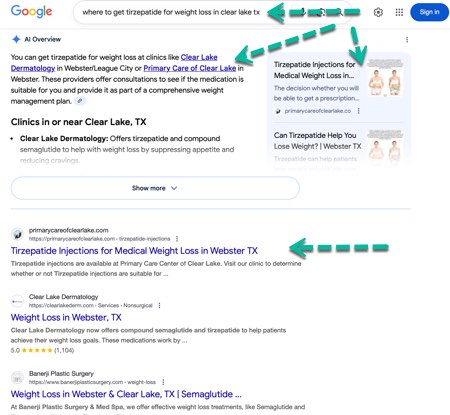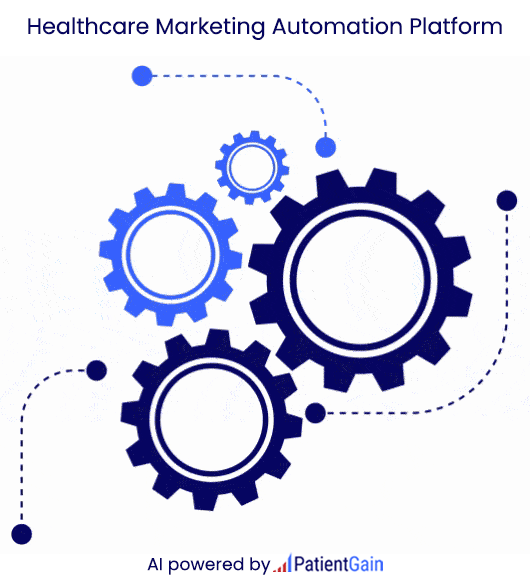What is google medical SEO with AI mode?
Google AI Mode and Medical SEO: How it works and how PatientGain PLATINUM and PLATINUM+ service helps your practice. Google AI Mode, which uses advanced AI like Gemini, is changing search and impacting how healthcare organizations approach Search Engine Optimization (SEO). It moves beyond traditional lists of links, giving users a more conversational, personalized, and intelligent experience.
Example of a medical SEO AI overview: A patient is looking for a specific medical weight-loss treatment in a local area in Texas.


Here’s how AI Mode impacts medical SEO:
1. Focus on Conversational Queries and AI-Generated Summaries:
- AI Mode prioritizes answering questions directly with AI-generated summaries and curated recommendations, often bypassing traditional search results entirely.
- Users engage in conversations with the AI, asking multi-part questions, instead of just using keywords.
- Healthcare content must be structured to align with AI’s understanding and potentially appear in these summaries to maintain visibility.
2. Shift from Keyword Stuffing to Establishing Authority:
- AI Mode uses a mix of sources, including Google Business Profiles, online reviews, relevant directory listings, website content, and trusted health-related sites to generate responses.
- Focus on clear, useful content, accurate and detailed business profiles, consistent local listings, and positive patient reviews to increase the chances of being featured.
- Demonstrate expertise, authoritativeness, and trustworthiness (E-E-A-T) by showcasing credentials, citing reliable sources, and adhering to ethical guidelines.
3. Importance of Structured Data and Multi-Modal Content:
- Implement schema markup, such as medicalCondition or physician, to help AI understand your content’s context and relationships.
- Provide multi-modal content, including text, images, videos, and interactive tools, as AI prioritizes these formats.
- Optimize images and videos with alt text, metadata, and structured tagging to ensure AI can recognize and prioritize them.
4. Predictive SEO and Staying Ahead:
- AI doesn’t just respond to searches, it anticipates them, enabling healthcare marketers to align content with evolving patient concerns before they become mainstream queries.
- Proactively create comprehensive content hubs that address emerging concerns to ensure long-term content sustainability and dominance in AI-curated results.
- Stay informed about the latest developments in AI-driven search and refine content strategies to align with evolving ranking signals.
In summary, Google AI Mode and its underlying AI technologies are transforming medical SEO. Healthcare organizations must adapt by focusing on conversational search, establishing authority, leveraging structured data and multi-modal content, and embracing predictive SEO to remain competitive and visible in this evolving landscape.
“Google AI Mode” isn’t an official product name from Google, but it’s an accurate way to describe the fundamental shift in how Google’s search engine operates as of 2025. It refers to the deep integration of advanced artificial intelligence, particularly Generative AI, into the search results page. This evolution, most notably seen as AI Overviews, has profound implications for all of SEO, especially in a high-stakes field like medicine.
How PatientGain.com adapts its Medical SEO strategies to thrive within it.
What is “Google AI Mode”?
“Google AI Mode” represents Google’s move from being a simple list of links to becoming an answer engine. Instead of just pointing you to a website, the AI now synthesizes information from multiple top-ranking, highly trusted sources to create a direct answer, or an “AI Overview,” right at the top of the search results.
For medical searches—which Google classifies as “Your Money or Your Life” (YMYL) topics—this AI is programmed with extreme caution. It will only generate answers and cite sources that it determines to be exceptionally credible, authoritative, and trustworthy.
Key characteristics of this “AI Mode” include:
- AI Overviews: AI-generated summaries that directly answer a user’s query.
- Deeper Contextual Understanding: The AI understands user intent and conversational language, not just keywords. It knows that “doctor for chest flutters” and “cardiologist specializing in arrhythmia” are related.
- Emphasis on E-E-A-T: It massively prioritizes Experience, Expertise, Authoritativeness, and Trustworthiness.
- Synthesis of Information: It pulls data not just from web pages but also from Google Business Profiles, reviews, videos, and structured data to build a comprehensive answer.
How “Google AI Mode” Applies to Medical SEO
This shift changes the rules of the game. The goal is no longer just to rank #1; it’s to become a trusted, citable source for Google’s AI. If Google’s AI doesn’t trust your practice’s website, your visibility will plummet.
Here’s how PatientGain.com applies its Medical SEO strategies specifically for this new AI-driven landscape:
1. Strategy: Doubling Down on E-E-A-T Content
- The AI Challenge: The AI needs to be certain that the medical information it uses is from a qualified expert.
- PatientGain.com Application:
- Authoritative Content Creation: PatientGain content AI agent and human team creates comprehensive, medically focused service pages that go beyond basic descriptions. They answer common patient questions, discuss benefits, explain procedures, and cite credible sources.
- Showcasing Expertise: Every piece of content is clearly attributed to the services being offered at the practice. PatientGain content AI agent and human team ensure doctor bio pages are detailed, listing credentials, board certifications, published papers, and years of real-world Experience. This builds the author’s credibility, which the AI scrutinizes.
2. Strategy: Optimizing for “Answer-ability”
- The AI Challenge: The AI looks for clear, concise answers to specific questions to include in its Overviews.
- PatientGain.com Application – PatientGain content AI agent and human team:
- Structure: They structure website content logically with clear headings (H1, H2, H3). For example, a page about Botox will have specific sections like “How Does Botox Work?”, “What to Expect During Treatment?”, and “Is Botox Safe?”.
- FAQ Schema: PatientGain content AI agent and human team builds out detailed FAQ sections on service pages and implement “FAQPage” schema markup. This directly Spoon-feeds the AI with questions and answers in a format it loves, increasing the chance of being featured.
3. Strategy: Feedback from patients – Capturing patient provided feedback and using it to highlight positive experiences
- The AI Challenge: The AI uses patient reviews as a primary signal for Trustworthiness and real-world Experience. A practice with few or poor reviews is seen as a risk.
- PatientGain.com Application:
- PatientGain’s Reputation Management apps are used to actively request reviews from satisfied patients. A steady stream of recent, positive reviews on Google, Healthgrades, and other platforms sends powerful trust signals that directly influence both AI rankings and patient decisions.
4. Strategy: Perfecting the Google Business Profile (GBP or GMB)
- The AI Challenge: For local searches like “med spa near me,” the AI Overview relies heavily on the structured, verified data within Google Business Profiles.
- PatientGain.com Application:
- PatientGain’s Local SEO service optimizes important aspects of the GBP. This includes ensuring all services are listed correctly (e.g., listing “HydraFacial” and “Morpheus8” as specific services), hours are always accurate, photos are high-quality, and the GBP Q&A section is actively managed. This makes the practice’s GBP a pristine, reliable data source for the AI.
5. Strategy: Implementing Advanced Schema Markup
- The AI Challenge: The AI is smart, but it benefits from clear labels. Schema markup is code that labels your website’s content so the AI can understand it instantly.
- PatientGain.com Application:
- PatientGain’s website app & team implements advanced, medical-specific schema. This includes:
PhysicianorMedicalClinicschema to define who you are.MedicalProcedureschema to detail your services.Reviewschema to highlight your star ratings.
- This structured data makes it effortless for Google’s AI to pull accurate information about your doctors, services, and reputation for its AI Overviews.
- PatientGain’s website app & team implements advanced, medical-specific schema. This includes:
In summary, thriving in “Google AI Mode” means shifting the focus of Medical SEO from simple keyword ranking to becoming the most authoritative, trustworthy, and easily understood source of information in your specific medical field and local area. PatientGain.com’s approach is to use its integrated platform to build these signals of trust and authority through expert content, stellar reviews, structured data, and a perfectly optimized local presence, ensuring their clients are not just visible but are seen as the definitive answer by Google’s AI.

